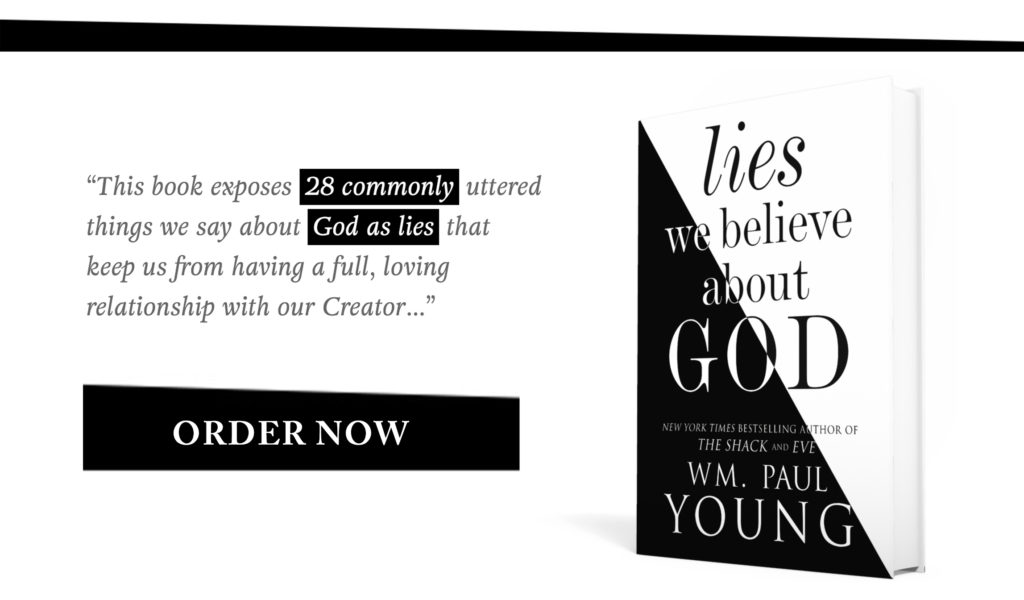
I wrote The Shack at the request of my wife, Kim. She’d asked, “Would you someday please write something as a gift for our kids that puts in one place how you think? Because, you know, you think outside the box.” She was referring to my lifelong struggle with conflicts between faith and religion, and to my work both theologically and personally as I searched for helpful ways to think about God and humanity. Later, after I delivered the Christmas present, she told me that she had been thinking four to six pages. Oh well!
Obviously, the book has become something much bigger than what I’d originally intended for a small audience. As of this writing, The Shack has sold around 20 million copies. For me, this whole adventure has been a God-thing, but not everyone views it this way. While that book offered alternative ways of thinking about God and humanity that resonated intensely with many, it also challenged deeply held assumptions and embedded paradigms. For some, this was not a God-thing or even a good thing. Occasionally, precious people took issue with the imagery and concepts. I understand their concerns about my writing and, even more, am aware of many of the reasons such apprehension exists.
There is the infamous page 184 (depending on your edition), which has been a topic of passionate conversation on many occasions. In the course of an exchange with the main character, Mackenzie, Jesus says,
“Who said anything about being a Christian? I’m not a Christian.”
Allow me to give you some background for this statement.
The term Christian was originally an insult directed at the followers of Jesus, years after the resurrection.
It basically meant “little-Christs” or “mini-Messiahs” and was intended to demean the ragtag, ragamuffin members of “that Jesus’s Way cult.” You can imagine the litany of accusations brought against them by people who thought they were dangerous, both to the empire and to the religions of the day.
“Who do you think you are? You live your life without any real allegiances—not to Rome, not to politics, not to Moses; and you waste your time caring for the poor, the slave, the prisoner. Your relationships matter more to you than your country or culture. You are all about this turning-the-other-cheek and going-the-extra-mile nonsense—both impractical ways of living, with naïve commitments to other-centered, self-giving love. That will never work in this world. Sure, you don’t return evil with evil, you work hard, and tell the truth; but we can’t count on you to keep our systems going. You are just a bunch of idealistic losers who are under the delusion that death can be defeated and who think the world could possibly be changed by love: little-Christs, that is all you are.”
The idea that God is not a Christian is quite disconcerting to those of us who subtly, if not overtly assume that our religious, human-defined “Christian way” is the best way and the way others should follow. Please hear me out: God is not a Muslim, either, or a Buddhist, an atheist, an animist, or any other category that we humans have manufactured in order to confiscate God and God’s “blessings” over to our side of the ledger.
Why do we do this? Why must we insist on creating ways to define ourselves in opposition to someone else? Why do we then build empires based on these divisions, justifying our superiority and our brutality? We act as if our empires are condoned and supported by God.
The Scripture states that all things were created in and through and by Jesus, and it emphasizes that not one single thing has come into existence apart from Jesus. But our religions assume separation—being apart—so when we hear the word Christian, we think of someone who started on the outside but then prayed a prayer or did something special that moved him or her from outside to inside. However, as the creator and redeemer and sustainer of all things (and this includes every single human being), Jesus challenges every religious category.
If we take Jesus seriously, then we are not dealing with outsiders and insiders; we are dealing with those who are seeing and those who are not seeing, trusting and not trusting.
So is God a Christian?
If you are asking if God is about separation and treats people of different denominations, faiths, and ways of thinking as outsiders until they pray a special prayer to “get in” . . . then, of course not. If you are asking, does God relate to all of us as beloved insiders who are completely ignorant and miserable, does God love us and incessantly find ways to lead us to discover Jesus as our only way, truth, and life . . . then, of course.
The New Testament was originally written in common Greek—Koine Greek (most of it). Guess what the Greek word for accuse is, as in “the Satan is an accuser”? (see Revelation 12:10). It is kategoro, from which we get the English word categorize. It means to put something or someone into a group to categorize them.
We do this all the time, not always improperly, either. But when such categorizations carry an implicit judgment of value and worth, we are joining the adversary of our humanity, the Satan. Entering into divisive accusation reduces if not disintegrates the unity of our common humanity, and we become butchers of the Body of Christ.
Categories might be helpful in aiding our understanding and navigation through this cosmos in which we all dwell, but categories are powerfully divisive and destructive to relationships. For a child to learn the difference between me and you, parent and non-parent, safe and not safe, is good, but categories meant to establish healthy boundaries often turn into walls that frame prisons both for the “other” who are outside and the “we” who are inside.
If we all lived isolated in caves and were free to create all the boxes we wanted, that would be fine—no harm, no foul. But we don’t. We live in community, and while many of us battle against an entitled, moral sense of cultural and religious superiority, we still have a tendency to cram everything into tidy mentally and verbally crafted boxes.
Believing (trusting) is an activity, not a category. The truth is that every human being is somewhere on the journey between belief and unbelief; even so, we perpetuate the categories of believer and unbeliever.
I am regularly asked if I am a Christian.
My usual response is, “Would you please tell me what you think one is, and I will tell you if I am one of those.”
If the previous “little-Christ” description is how people today defined Christian, I would wholeheartedly accept and embrace such a categorization, and I would do it as a member of all the struggling communities of Jesus followers whether in the first or the twenty-first century. It is of utmost honor to be an expression of Christ and His life into the cosmos, to be that sort of Christian.
In The Mystery of Christ—and Why We Don’t Get It, Robert F. Capon writes:
Christianity is not a religion. Christianity is the proclamation of the end of religion, not of a new religion, or even of the best of all religions. If the cross is the sign of anything, it’s the sign that God has gone out of the religion business and solved all of the world’s problems without requiring a single human being to do a single religious thing. What the cross is actually a sign of is the fact that religion can’t do a thing about the world’s problems—that it never did work and it never will.
Christianity is not “the way.” Jesus is the Way!
—WPY
PS) This is actually chapter five of my new book, Lies We Believe About God. There are 27 more “lies” where this one came from. Order your copy or preview the book here!

